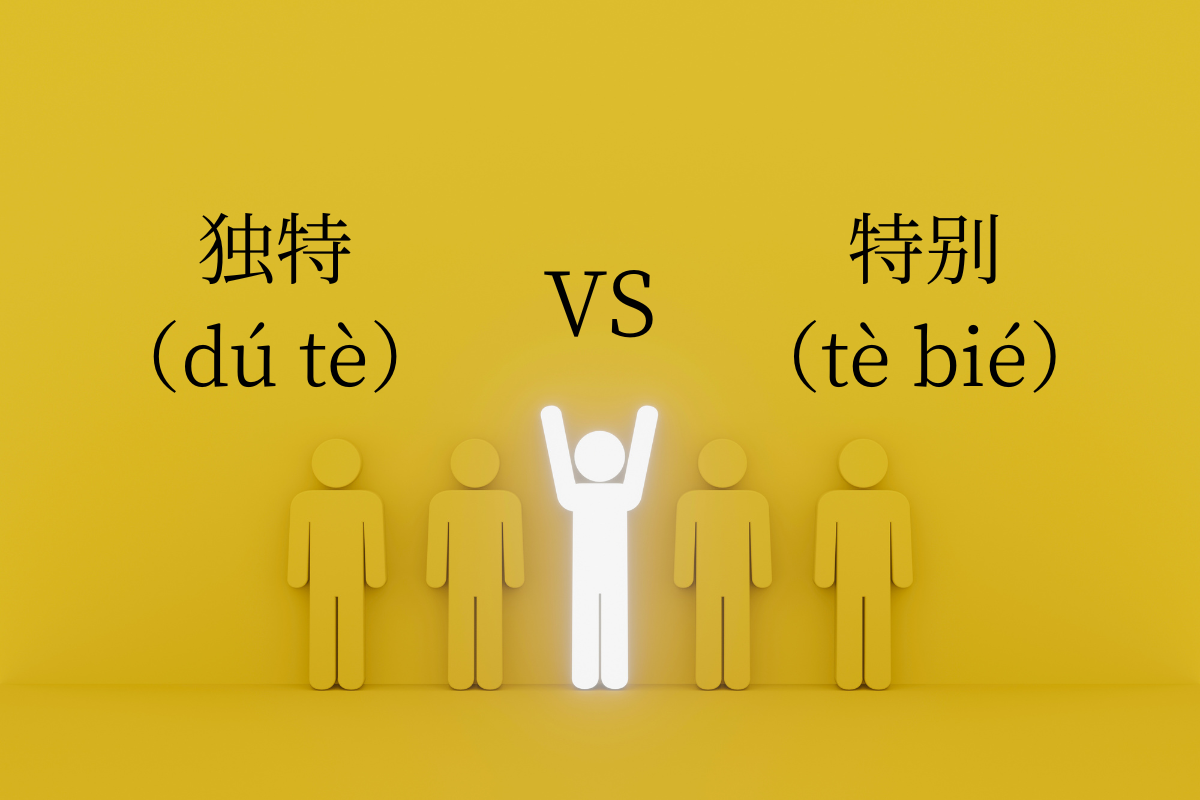HSK Words: 独特 (dú tè) VS 特别 (tè bié)
Today we will explore the differences between the two HSK words: 独特 (dú tè) and 特别 (tè bié). Although both words seem similar, their meanings are distinct, and understanding the differences will help you use these words accurately in daily Chinese communication.

独特 (dú tè) means unique or distinctive, with a focus on being one of a kind or having special features that set it apart from others. It implies something that is unique in its characteristics or qualities, and cannot be compared to anything else.
Examples:
- This artwork has a unique style that leaves a profound impression on people.
这件艺术品具有独特的风格,给人留下深刻的印象。
zhè jiàn yì shù pǐn yǒu dú tè de fēng gé , gěi rén liú xià shēn kè de yìn xiàng 。 - He has a unique idea that always comes up with innovative solutions.
他有一个独特的想法,总能提出一些新颖的解决方案。
tā yǒu yí gè dú tè de xiǎng fǎ , zǒng néng tí chū yī xiē xīn yǒu de jiě fàng luò jiě jué 。 - The dishes at this restaurant have unique flavors that leave a lingering taste.
这家餐厅的菜肴具有独特的口味,让人回味无穷。
zhè jiā cān tīng de cài yáo yǒu dú tè de kǒu wèi , ràng rén huí wèi wú qióng 。
特别 (tè bié) means special or particular, with an emphasis on being unique or outstanding. It implies something that is special in its characteristics or qualities, and can be distinguished from others.
Examples:
- Today's weather is particularly clear and pleasant, suitable for going out for a walk.
今天的天气特别晴朗,适合出去散步。
jīn tiān de tiān qì tè bié qíng lǎng , shì hé chū qù sàn bù 。 - This game is particularly fierce, with both teams giving their all.
这场比赛特别激烈,双方都拼尽了全力。
zhè chǎng bǐ sài tè bié jī liè , shuāng fāng dōu pīn jìn le quán lì 。 - This holiday is particularly important, and there are grand celebration activities held every year.
这个节日特别重要,每年都会举行盛大的庆祝活动。
zhè gè jié rì tè bié zhòng yào , měi nián dōu huì jǔ xíng shèng dà de qìng zhù huó dòng 。
In conclusion, while both 独特 (dú tè) and 特别 (tè bié) can imply something unique or outstanding, 独特 emphasizes something that is one of a kind or distinctive, while 特别 emphasizes something that is special or outstanding. Understanding the differences between these words will help you use them appropriately in Chinese communication.
Quiz: Please consider whether to use 独特 (dú tè) and 特别 (tè bié) in the following sentences.
- 这幅画作的风格非常____,无法和其他画作相提并论。
zhè fú huà zuò de fēng gé fēi cháng ____ , wú fǎ hé qí tā huà zuò xiāng tí lùn 。 - 这家餐厅的菜肴____美味,每一道菜都让人回味无穷。
zhè jiā cān tīng de cài yáo ____ měi wèi , měi yī dào cài dōu ràng rén huí wèi wú qióng 。 - 他的想法非常____,总能给人带来新的启示。
tā de xiǎng fǎ fēi cháng ____ , zǒng néng gěi rén dài lái xīn de qǐ shì 。
Answer:
- 特别 (tè bié)
- 特别 (tè bié)
- 独特 (dú tè)